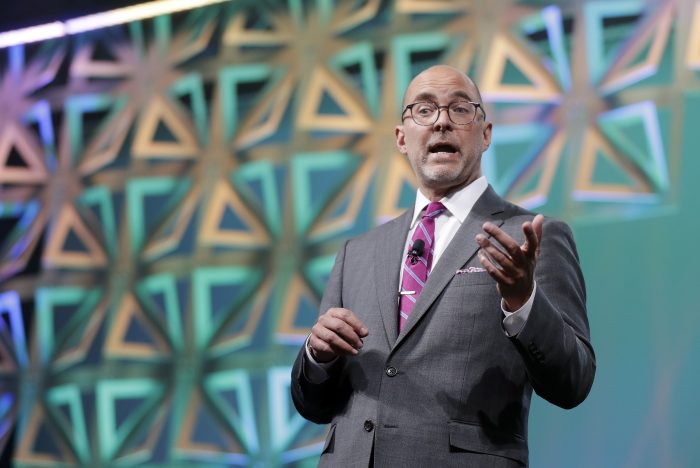Today’s innovators delivered their ideas via fast-paced, five-minute “TED Talk” style presentations.

Steve Boese, pictured earlier this week, opened the Ideas & Innovators session Friday on the final day of the HR Technology conference at the Venetian in Las Vegas. (Photo by Isaac Brekken for Human Resource Executive)
The Ideas & Innovators session at HR Tech is often one of the most dynamic at the conference and this year’s was no exception. Today’s session offered 10 presenters delivering their ideas via fast-paced, five-minute “TED Talk” style presentations with PowerPoint slides timed to advance every 15 seconds.
One of the presenters, Reppify’s Chirag Nangia, called on HR to do a better job with employee referrals.
“Referrals often make the best employees,” he said, noting that they have the lowest termination rates of all employees, are 30% less likely to quit and are the least costly to recruit–even when factoring in referral bonuses for the referring employees. However, Nangia added, at too many companies the referral process is manual and outdated, which can cause the organization to potentially miss out on some valuable hires.
SUBSCRIBE here to receive our daily emails.
Montra Ellis of Ultimate Software called for a “code of ethics for AI.”
Ellis herself loves the innovations enabled by AI. “I can’t live without Alexa—she never judges me for the things I order,” she said, prompting laughs from the audience. “But AI—in the form of algorithms—can also send people to prison. Algorithms can determine that of two people convicted for the same crimes, one is likelier to be a re-offender. The trouble is, that person is often likelier to be the darker-skinned person.”
Amazon’s facial recognition software has been found to be biased against minorities, said Ellis. The tech community needs to do better, she said.
“We can change the data sets,” she said. “We can explode the ‘black box.’ We as humans need guardrails. We can maximize equality algorithmically.”
TalentRISE’s Carl Kutsmode recalled a recent trip he took to the Galapagos Islands where he encountered a young disabled girl traveling with her parents. Defying preconceived notions, the girl was nearly always the first one to reach the summit of various mountain hikes his group took.
“How often do we allow bias to affect the first five minutes of a job interview?” he asked. “We reject people too quickly. Maybe we need to open our eyes a bit more.”
Watch our HR Tech 2019 videos here.
Evaluate the recruiting tools you use for unintentional bias, said Kutsmode. “The tools you use–they could be programmed with bias. And, let go of your own biases.”
Instructure’s Jeff Weber asked the audience to consider better ways of developing their organization’s people. “We did 200-plus interviews of employees to find out what is and isn’t working in employee development. Nearly 77% said they felt alone in their career development,” he said.
HR leaders should evaluate their mentoring programs to see what can be improved, said Weber. “Employees want to learn, grow and share with people who care about them. Consider tools that can help you build communities of experts.”
Yvette Cameron of Constellation Research said “self-sovereign identities” will be the wave of the future as innovations such as blockchain make it easier for employees to take their personal data with them and control who has access to it.
“We don’t own data—individuals do,” she said. “Dozens of companies are using blockchain to develop platforms that allow for self-sovereign identities. We as employers should embrace it.”
Miss anything at HR TECH: See our full coverage here.
Capacity’s David Karandish reminded the audience that “we’ve identified a secret within nearly every company: ‘cultures of proficiency’ and ‘cultures of creativity’ are waging a battle for its soul.”
Some teams within companies are focused on proficiency while others embrace creativity, he said. It’s created a “paradox” that companies must solve in order to produce excellent work, he added.
“When you separate out creative designs vs. proficient processes via automation, you can create great work,” said Karandish.
WATCH: See video of Karandish describing Capacity.


Recent Comments